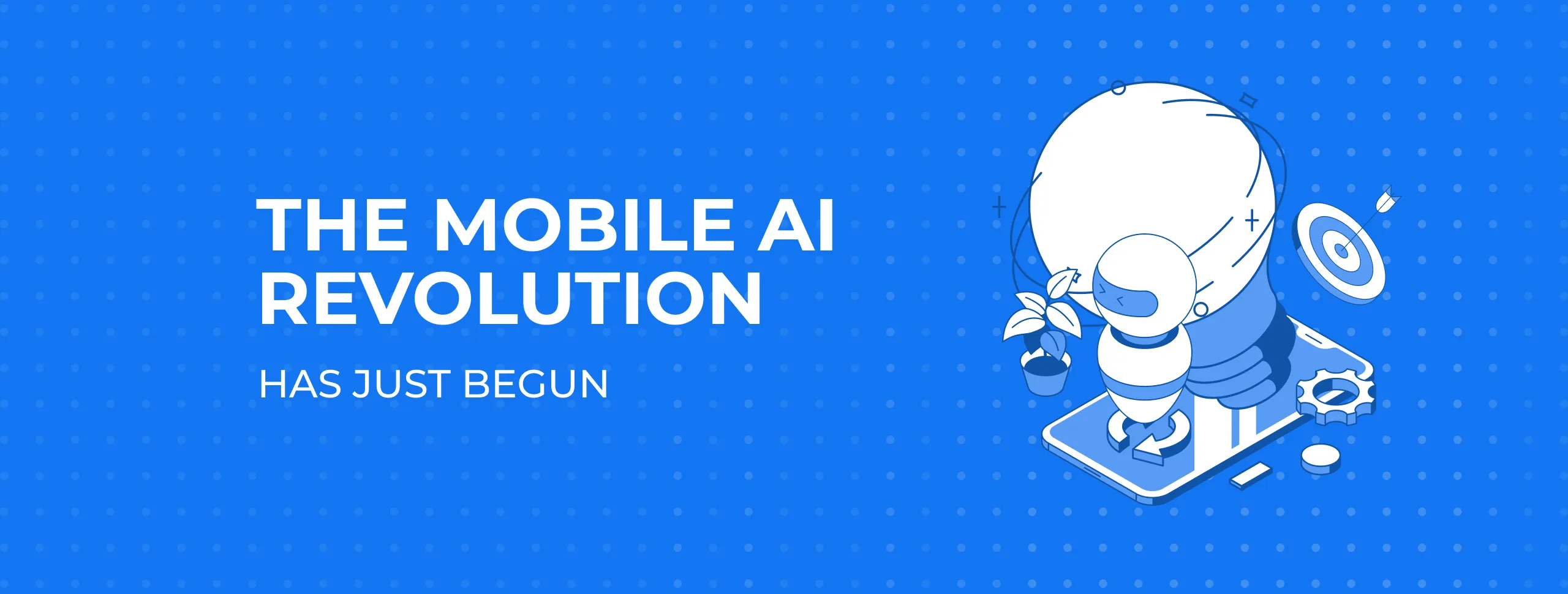
The Mobile Artificial Intelligence Revolution Has Just Begun

The mobile AI revolution is beginning to open up new and exciting possibilities for applications. Apple launches face detection features. And now Huawei presents its new Mate 10, the first mobile with the same brain as a wasp, a smartphone with Artificial Intelligence.
Smartphone Artificial Intelligence in a Nutshell
The Mobile Artificial Intelligence (AI) revolution promises to reshape things in the next few years. It will also be a revolution very different from what we have known so far, because it is no longer just a question of increasing the processing power of smartphones, but of a real concept change that involves giving our phones the ability to learn and decide for themselves the best way to function.
Up to now, the challenge had consisted of making processors smaller and more powerful, faster CPUs, more efficient graphic processors, chips, in short, that multiplied their capacity of calculation, their graphic power, and at the same time minimized battery consumption. But mobile Artificial Intelligence is not about that. Or at least not just that. Our computers can, yes, make millions, or billions, of processes per second, but they will remain blind and alien to the world around them.
The human brain vs mobile AI?
The human brain can not and can never be faster than a conventional processor when it comes to making calculations, analyzing complex systems, making statistics or calculating probabilities. But it can instantly differentiate a dog from a cat, something that no conventional processor can do without first analyzing and comparing thousands of variables, combinations, shapes, figures, and scattered data. An analysis that can take hours, and turns those types of tasks into something impractical or, at the very least, impractical for our daily use of a mobile phone.
This is precisely where the mobile AI puts its focus. Because it is about getting our smartphones to be able to "learn" directly from its environment, and also use what is learned to make their own decisions and be more efficient, in a way that no conventional CPU can achieve.
Technical battle: Google, Microsoft, Intel, IBM and others
This promises to be the trend for the next few years. It has instigated a whole new technological war that already faces several competitors. For example, the maker of Qualcomm processors, with its recent Snapdragon 835, claims that it is already prepared for Artificial Intelligence. Other manufacturers of processors, such as AMD, Intel MediaTek or Samsung, have also joined, or are about to, this new technological race.
So far, it could be said that smartphones have benefited from artificial intelligence in an indirect way. AI in the cloud, in fact, is already a reality, and its applications are multiplying everywhere. However, its use from a smartphone is limited by problems such as latency, stability of platforms or privacy risks. Something that would not happen if the AI were not only in the cloud, but also "embedded" in the mobile itself.
Google, for example, has spent years working on Artificial Intelligence solutions in the cloud, and allows mobiles to enjoy them through apps like the popular "Photos", which we can ask, among other things, to show us in screen all the images we have of a specific object (cat, dog, paella, children.)
Another giant, Microsoft, develops simultaneous recognition and voice recognition systems based on Artificial Intelligence, while IBM continues to refine its Watson platform, a global knowledge system capable of answering questions formulated in natural language, performing analysis and relating data in a way that until now seemed impossible. All this, however, is very difficult to implement in a «smartphone».
Iphone 8
With AI in full development in the cloud, Apple made a recent presentation of their new iPhone 8, 8 Plus and X. The signature of the Apple, in fact, presented with its new mobiles the processor A11 Bionic, the first of the company that integrated a "neural processor" able to analyze their environment and react accordingly. In performance tests, the new chip literally destroyed its entire competition, with more than twice the performance and only half the battery consumption of others. Apple used the newly acquired "intelligence" of its iPhone to improve camera performance, speed and power consumption, but above all to present to the world a new facial recognition system, Face ID, totally different from what existed hitherto.
Huawei new Mate 10
Chinese multinational Huawei has just introduced to the world its new Mate 10, the first Android mobile with built-in Artificial Intelligence and features, according to Chinese multinational sources, which dwarf the iPhone 8.
At the end of August, Huawei presented its new processor Kirin 970, the first that, along with the usual CPU and GPU, also has a Neural Processing Unit (NPU). Manufactured with 10 nanometer technology, the new processor condenses 5.5 billion transistors in just one cm. square, and thanks to its NPU, multiplies by 25 the performance of other processors, with a power consumption 50 times lower.
- If we ask someone what the 100th digit of the Pi number is, nobody would know it, whereas a conventional CPU would respond immediately. But if we ask "Is this a table?", The CPU will compare shapes, angles and figures before answering. A human, on the other hand, will do so immediately. Our brain is a veritable processor of knowledge, and the NPU also. From the historical data (experiences) of which he is learning, the Neural Processing Unit is able to predict, draw conclusions and decide the best way to act.
If you open the camera of a mobile for 24 hours in a row, it will capture a lot of scenes. You can process those scenes on the network, but it will be a long and very expensive process in connections. But if you process them in real time, within the mobile itself, everything will be faster and cheaper, and you will use much less energy. Mobiles need to perceive the environments in which they are, to understand what they see and to act accordingly.
AI: What feature benefits the most?
It is not surprising, then, that one of the main applications of Artificial Intelligence of Mate 10 is in the field of photography. The phone, in effect, is able to recognize what is in front of you when you open the camera: a face, a landscape, an animal, food, a moving subject, a night scene, and automatically configure all its parameters in milliseconds to obtain, on each occasion, the best photo possible. The phone also has the ability to learn as we use it, so that it never responds to a pre-set configuration, but changes it according to its "experiences. "Mate 10 recognizes, for now, 13 different types of objects or scenes, and reacts accordingly when detecting any of them. To achieve this basic knowledge, which is included from the factory, each smartphone has been "fed" with more than 100 million photographs.
- Equipped with a dual main camera (one 20-megapixel monochrome and one 12-megapixel color), it also has a f / 1.6 aperture, allowing you to capture much more light in night or dimly lit scenes.
- And The Pixel 2 will boast special AI features. For example Google Lens. This a way of searching on Google by pointing your camera at a landmark, object or storefront, which can give you quick access to reviews and store hours. And it might help identify that mysterious building you walk by every day. Google Lens will also pull out web addresses and phone numbers from signs so you can browse or call with just a light touch of the button.
Real time
Another possibility of the smartphone’s processor is "real-time computerized vision" or enriched augmented reality, which is the possibility of obtaining complementary information about a photograph, or about what we see through of the camera. Thanks to AI, in fact, the mobile can tell us what building is on the screen, or what work of art or character. To do this, and without our noticing, the phone will download images (at a rate of 2,005 per minute) to compare with the one in front. In the same way, it will also be able to accurately recognize any text that appears on the screen and transcribe or translate it into any language.
Bonus features
Other facts about AI we have collected: In Google Pixel 2, there is an AI-powered feature - Now Playing. Connected with a database of songs updated weekly, the phone will tell you immediately what music is playing in the background by automatically pushing a notification on the home screen. No need to access similarly dedicated smartphone apps like Shazam.
By understanding language and images, AI will also boost Google features such as live translations and Google Lens; the Google search you can trigger by taking a picture.
Summary
With the rise of artificial intelligence, the future seems exciting and prosperous. Soon you will be able to develop mobile applications, which will take things to the whole new level. Have a look at some artificial intelligence features, what are already available in mobile apps:
Soon the mobile phone will be our assistant and can respond to mail, or even phone calls, for us. This is the new reality: an intelligent smartphone.





